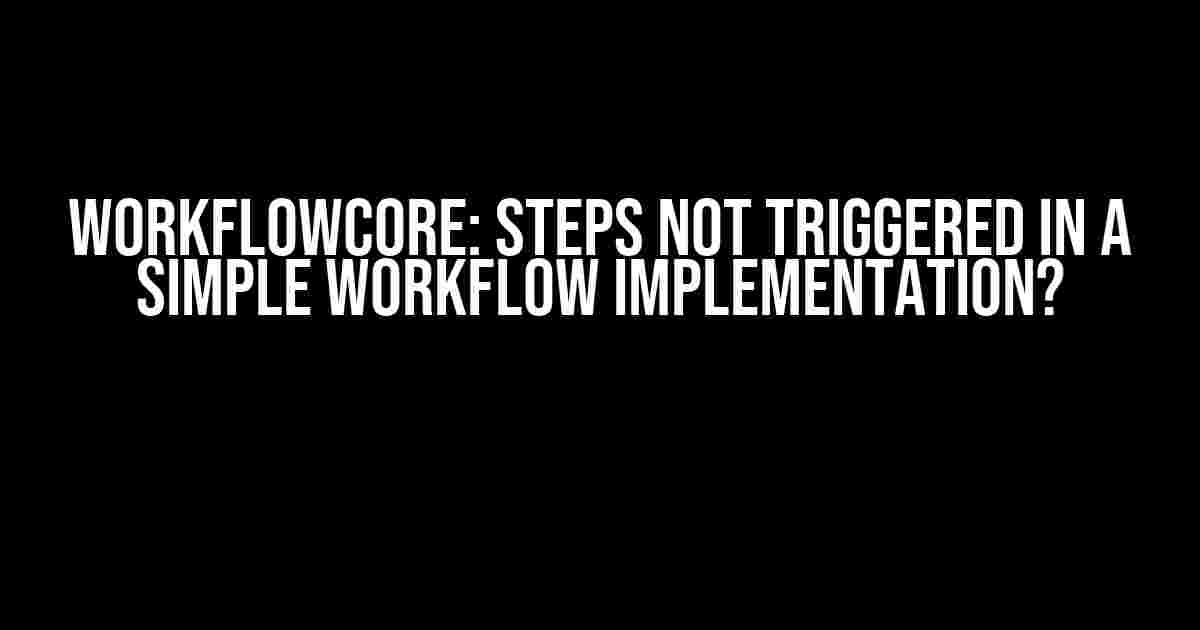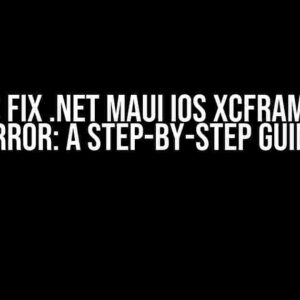Are you stuck with WorkflowCore, where your steps just won’t trigger? You’re not alone! In this article, we’ll dive into the common pitfalls and provide a step-by-step guide to troubleshoot and resolve this frustrating issue.
What is WorkflowCore?
WorkflowCore is a popular open-source workflow engine for .NET applications. It allows you to design and execute complex workflows, making it an essential tool for many developers. WorkflowCore provides a robust and flexible framework for managing business processes, but like any powerful tool, it requires careful implementation to avoid issues.
The Problem: Steps Not Triggered
One of the most frustrating issues with WorkflowCore is when steps fail to trigger. You’ve set up your workflow, defined your steps, and started the workflow, but nothing happens. No errors, no warnings, just silence. This is often caused by simple mistakes or misunderstandings of how WorkflowCore works.
Common Causes of Steps Not Triggered
Before we dive into the solutions, let’s discuss some common causes of steps not triggering in WorkflowCore:
- Incorrect Step Configuration: A misconfigured step can prevent it from triggering. This includes incorrect step types, invalid step IDs, or malformed step data.
- Workflow Instance Not Started: If the workflow instance isn’t started, steps won’t trigger. Make sure you’re starting the workflow instance correctly.
- Step Dependencies Not Met: If a step has unmet dependencies, it won’t trigger. Ensure that all dependencies are satisfied before expecting a step to trigger.
- Event Not Raised: If the event that triggers the step isn’t raised, the step won’t trigger. Verify that the event is raised correctly and that the step is configured to listen to that event.
- Step Timeout or Cancellation: If a step times out or is cancelled, it won’t trigger. Check your timeout settings and ensure that the step isn’t being cancelled unexpectedly.
Troubleshooting Steps Not Triggered
Now that we’ve covered the common causes, let’s walk through a step-by-step troubleshooting process to identify and resolve the issue:
- Review Workflow Configuration: Double-check your workflow configuration, including step types, IDs, and data. Verify that everything is correct and matches your expectations.
- Verify Workflow Instance Status: Check the status of your workflow instance to ensure it’s started correctly. You can do this by checking the workflow instance’s status property or using the WorkflowCore dashboard.
- Check Step Dependencies: Review the dependencies for the step that’s not triggering. Ensure that all dependencies are satisfied and that the step is correctly configured to listen to the expected events.
- Debug Event Raising: Debug your code to verify that the event that triggers the step is being raised correctly. You can do this by adding breakpoints or logging statements to ensure the event is raised.
- Review Step Timeout and Cancellation: Check your step timeout settings and ensure that the step isn’t being cancelled unexpectedly. Verify that the step has sufficient time to complete and that it’s not being cancelled by another part of your application.
Example Code and Solutions
Let’s take a look at some example code to illustrate the solutions:
<code>
using WorkflowCore.Interface;
using WorkflowCore.Models;
public class MyWorkflow : IWorkflow<MyWorkflowData>
{
public void Build(IWorkflowBuilder<MyWorkflowData> builder)
{
builder
.StartWith<Step1>()
.Then<Step2>()
.Then<Step3>();
}
}
public class Step1 : StepBody
{
public override ExecutionResult Run(IStepExecutionContext context)
{
Console.WriteLine("Step 1 executed");
return ExecutionResult.Next();
}
}
public class Step2 : StepBody
{
public override ExecutionResult Run(IStepExecutionContext context)
{
Console.WriteLine("Step 2 executed");
return ExecutionResult.Next();
}
}
public class Step3 : StepBody
{
public override ExecutionResult Run(IStepExecutionContext context)
{
Console.WriteLine("Step 3 executed");
return ExecutionResult.Next();
}
}
</code>
In this example, we have a simple workflow with three steps. Let’s say Step 2 isn’t triggering. To troubleshoot this, we would:
- Review the workflow configuration to ensure Step 2 is correctly defined and linked to Step 1.
- Verify that the workflow instance is started correctly and that Step 1 has completed successfully.
- Check the dependencies for Step 2 to ensure it’s correctly configured to listen to the expected event.
- Debug the code to verify that the event that triggers Step 2 is being raised correctly.
- Review the step timeout settings and ensure that Step 2 isn’t being cancelled unexpectedly.
Solution 1: Ensure Correct Step Configuration
In this scenario, the issue is often due to an incorrect step configuration. Check that the step type, ID, and data are correct and match your expectations.
<code>
builder
.StartWith<Step1>()
.Then<Step2>(step => step.Id = "Step2") // Ensure correct step ID
.Then<Step3>();
</code>
Solution 2: Verify Workflow Instance Status
Ensure that the workflow instance is started correctly. You can do this by checking the workflow instance’s status property or using the WorkflowCore dashboard.
<code>
var workflowInstance = await workflowHost.StartWorkflowAsync(myWorkflowData);
if (workflowInstance.Status == WorkflowStatus.Started)
{
Console.WriteLine("Workflow instance started correctly");
}
else
{
Console.WriteLine("Workflow instance not started");
}
</code>
Solution 3: Check Step Dependencies
Review the dependencies for the step that’s not triggering. Ensure that all dependencies are satisfied and that the step is correctly configured to listen to the expected events.
<code>
builder
.StartWith<Step1>()
.Then<Step2>(step => step.ListenTo<Step1Completed>()) // Ensure correct event listening
.Then<Step3>();
</code>
Solution 4: Debug Event Raising
Debug your code to verify that the event that triggers the step is being raised correctly. You can do this by adding breakpoints or logging statements to ensure the event is raised.
<code>
public class Step1 : StepBody
{
public override ExecutionResult Run(IStepExecutionContext context)
{
Console.WriteLine("Step 1 executed");
context.RaiseEvent<Step1Completed>(); // Verify event raising
return ExecutionResult.Next();
}
}
</code>
Solution 5: Review Step Timeout and Cancellation
Check your step timeout settings and ensure that the step isn’t being cancelled unexpectedly. Verify that the step has sufficient time to complete and that it’s not being cancelled by another part of your application.
<code>
builder
.StartWith<Step1>()
.Then<Step2>(step => step.Timeout = TimeSpan.FromSeconds(30)) // Ensure sufficient timeout
.Then<Step3>();
</code>
Conclusion
WorkflowCore is a powerful tool for managing complex workflows, but it requires careful implementation to avoid issues. By following the troubleshooting steps and solutions outlined in this article, you should be able to identify and resolve the issue of steps not triggering in your WorkflowCore implementation.
Tips and Best Practices
To avoid steps not triggering in the future, follow these tips and best practices:
- Double-check your workflow configuration: Verify that your workflow configuration is correct and matches your expectations.
- Use the WorkflowCore dashboard: Use the WorkflowCore dashboard to visualize your workflow and identify potential issues.
- Test thoroughly: Test your workflow thoroughly to ensure that steps are triggering correctly.
- Log and debug: Log and debug your code to identify issues and troubleshoot problems.
- Follow WorkflowCore documentation: Follow the official WorkflowCore documentation and guides to ensure you’re implementing workflows correctly.
| Common Causes | Solutions |
|---|---|
| Incorrect Step Configuration | Verify
Frequently Asked QuestionGet answers to your WorkflowCore woes! Why aren’t my steps triggered in a simple workflow implementation?Hey there! Make sure you’ve registered the workflow and its steps with the WorkflowCore service. Typically, this is done in the Startup.cs file. Also, double-check that your step classes implement the correct interface (IStepBody or IAsyncStepBody) and are properly configured. Could it be a problem with my workflow configuration?That’s a great point! Workflow configuration can be a bit finicky. Verify that your workflow is correctly defined and registered with the correct Id and Version. Also, ensure that your steps are properly added to the workflow definition. What about debugging? Are there any tricks to help me figure out what’s going on?Absolutely! Enable debugging by setting the WorkflowCore logging level to Debug. This will give you more detailed information about what’s happening behind the scenes. You can also use Visual Studio’s built-in debugger to step through your code and identify any issues. I’ve checked everything, but my steps still aren’t triggered. What’s next?Don’t worry, we’ve all been there! If you’ve checked everything and are still stuck, try creating a minimal reproducible example (MRE) to isolate the issue. This will help you (and others) identify the root cause. You can also post your MRE on GitHub or a similar platform to get help from the WorkflowCore community. Are there any additional resources available to help me troubleshoot WorkflowCore issues?WorkflowCore has an amazing community and extensive documentation to help you overcome any hurdles. Be sure to check out the official WorkflowCore documentation, GitHub repository, and Stack Overflow tags for WorkflowCore. You can also search for blog posts, tutorials, and videos that cover WorkflowCore workflows and troubleshooting. |



